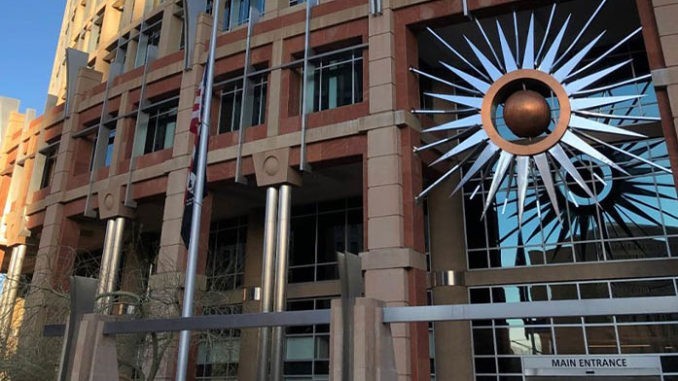
On Thursday, an Arizona trial court judge ruled in favor of a small business owner represented by the Goldwater Institute against the city of Phoenix and its Super Bowl Censorship Ordinance. The judge found the ordinance violated free speech rights and unconstitutionally delegated power to the National Football League (NFL) and Super Bowl Host Committee.
The ordinance barred residents from placing signs on their own property without first getting approval from the NFL and the Host Committee—two private entities that Phoenix empowered to choose what kind of speech people were allowed to engage in.
Declaring the ordinance “an unconstitutional prior restraint on speech and an unconstitutional delegation of power,” the court gave the city 48 hours to review businessman Bramley Paulin’s request to put up an advertising sign at his business—and to do so without restricting what he’s allowed to say.
Judge Bradley Astrowsky found:
“There is no legitimate government interest in content-based regulation of signs, let alone regulation of signs based on the content preferences of private businesses that are given special privileges by the government. Courts have recognized two substantial government interests that can sometimes justify regulations on commercial signage: public safety and aesthetics…
In summary, the City created the need for this litigation by enacting an unconstitutional resolution. They further exacerbated the problem, by only choosing to remedy their error when it was too late for Plaintiff to apply to exercise his right to speech. The City’s offer that Plaintiff can file his temporary sign application only if permitted by a private entity renders the application of an otherwise facially constitutional resolution to be unconstitutional. Accordingly, Court intervention is required. Given the delay already occasioned by the City and the testimony provided by David Williams that the City typically responds to an application for temporary signage within three to five days, the Court will order an expedited consideration of Plaintiff’s applications. When confronted with a constitutional flaw in a law, Courts should try to limit the solution to the problem. Ayotte v, Planned Parenthood of N. New England, 546 U.S. 320 (2006). This is what this Court does here.”
Phoenix officials first adopted the Super Bowl Censorship Ordinance last fall, declaring a section of downtown a “clean zone” in which people were prohibited from putting up a sign without having it reviewed and approved by the NFL and the Host Committee. Because those are private businesses, though, the ordinance effectively gave for-profit companies the unrestricted power to choose what messages they were willing to allow in a large section of one of the nation’s biggest cities. Bramley, a business owner in the area, hoped to sell space for advertising signs to businesses—but they shared concerns regarding the city’s prohibition on free speech.
When Bramley sued the city, asking a judge to declare the ordinance unconstitutional, the city assured him that it would change the law. So Bramley agreed to a brief postponement of the lawsuit, expecting the city to repeal the ordinance and respect freedom of speech. But that’s not what happened. Instead, city officials simply moved the goalposts. They changed the ordinance to eliminate the NFL’s power to directly approve signage. But through its permitting process, the city indirectly still allowed the Host Committee—which, like the NFL, is a private business—the same power to approve or disapprove of messages. So, Bramley returned to court, and in a brief trial on Wednesday morning, proved that the city was unconstitutionally restricting his freedom of speech.
“I’m relieved the court has ruled against the city’s attempt to let private organizations decide what I can and cannot say on my own property,” Bramley said after hearing this morning’s news. “The city should have never allowed this to happen in the first place: it’s wrong for the government to let the NFL and other private groups censor business owners like me, or any residents of the downtown area.”
The case was especially urgent because the Super Bowl is now only days away, meaning that each hour reduced Bramley’s ability to put up the advertising signs. In fact, due to the city’s attempts to run out the clock, he has already lost some potential contracts, although other advertising opportunities still remain. Given the approaching deadline, Bramley asked the court to order the city to process his application for a sign immediately—without requiring Host Committee approval. The judge agreed. “The City shall make a decision concerning Plaintiff’s applications within 48-hours,” the order declares.
